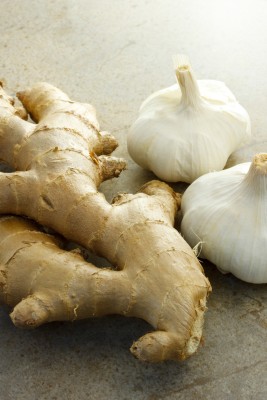|

by Case Adams
Naturopath
May 8, 2013
from
GreenMedInfo Website
Spanish version

Recent research has confirmed and quantified that whole extracts of
Garlic and Ginger have the ability to stop several species of
multi-drug resistant bacteria.
The newest research comes from Italy's University of Pisa.
The researchers tested garlic against
the infective bacteria,
-
Staphylococcus aureus
-
Pseudomonas aeruginosa
-
Escherichia coli
The research found that all three
bacteria species were
inhibited by the Garlic extract,
which was taken from fresh Garlic bulbs.
This research confirmed another recent study published in the
Asian Pacific Journal of Tropical Biomedicine, and conducted by
researchers from King Saud University and India's Rangasamy College.
This study focused on seven of the most dangerous superbugs - called
MDRs or multidrug resistant
bacteria.
These included,
-
E. coli
-
S. aureus
-
P. aeruginosa
-
Enterococcus faecalis
-
Klebsiella pneumoniae
-
Proteus mirabilis
-
Enterococcus cloacae
-
Bacillus subtilis
The particular strains used in the study
were some of the most multi-drug resistant strains known. Some of
the bacteria strains tested against the Garlic and Ginger were
resistant to more than 10 different antibiotics.
These antibiotics included,
-
ampicillin
-
amoxicillin
-
amikacin
-
cephalothin
-
chloramphenicol
-
ciprofloxacin
-
ceftriaxone
-
clindamycin
-
co-trimoxazole
-
erythromycin
-
gentamycin
-
kanamycin
-
methicillin
-
novobiocin
-
nalidixic acid
-
norfloxacin
-
ofloxacin
-
penicillin
-
rifampicin
-
streptomycin
-
tetracyclin
-
vancomycin
The researchers utilized whole Garlic
and Ginger for the tests - ground with mortar and pestle.
They utilized dimethyl sulphoxide as an
extract medium. The researchers conducted repeated multiple
laboratory tests using four different concentrations of the two
herbal extracts, both separately and together.
With the exception of Enterobacter sp. and Klebsiella sp., the
researchers found that all of the bacteria tested were inhibited to
some degree by the ginger and garlic.
-
The bacteria inhibited the most
by Ginger included P. aeruginosa, E. coli and Bacillus sp.
-
The Garlic extract inhibited P.
aeruginosa the greatest, followed by E. coli and Bacillus
sp.
-
The Garlic cloves ethanol
extract showed similar inhibition zones against Proteus sp.,
Enterobacter sp. and S. aureus.
The researchers added:
"It is interesting to note that even
crude extracts of these plants showed good activity against
multidrug resistant strains where modern antibiotic therapy has
limited effect."
The research also indicated that the
antibiotic potential of these two herbs was due to their combination
of biochemicals - including their tannin, saponin, phenol, flavonoid
and essential oil content.
The antibiotic effects of these two herbs have been supported by
other studies, including one from researchers at India's University
of the Punjab.
This study tested both Garlic and Ginger
extracts against,
While the inhibitory effect with Ginger
was less, the Garlic extracts showed significant inhibitory activity
against these bacteria - some of the most lethal infective species
to humans.
The two measurements used to quantify the ability of these herbs to
inhibit the bacteria in these studies included Minimum Inhibitory
Concentration (MIC) and Zone of Inhibition.
The Minimum Inhibitory Concentration
measures the concentration of a substance in solution that will
inhibit the bacteria, and the Zone of Inhibition is the range of
inhibition - typically measured in millimeters.
These measurements are also used to
quantify the ability of antibiotic drugs to inhibit bacteria. Lower
MIC levels and greater inhibition zones equate to higher levels of
antibiotic potential.
Both
Garlic and Ginger have been used
for centuries to combat infections of different types.
The use of these herbs has crossed over
many traditional medicines around the world as well.
References
-
Casella S, Leonardi M, Melai B,
Fratini F, Pistelli L. -
The role of diallyl sulfides and
dipropyl sulfides in the in vitro antimicrobial activity of
the essential oil of garlic, Allium sativum L., and Leek,
Allium porrum L. Phytother Res. 2013
Mar;27(3):380-3.
-
Karuppiah P, Rajaram S. -
Antibacterial effect of Allium sativum
cloves and Zingiber officinale rhizomes against
multiple-drug resistant clinical pathogens. Asian
Pac J Trop Biomed. 2012 Aug;2(8):597-601.
-
Gull I, Saeed M, Shaukat H,
Aslam SM, Samra ZQ, Athar AM. -
Inhibitory effect of Allium sativum
and Zingiber officinale extracts on clinically important
drug resistant pathogenic bacteria. Ann Clin
Microbiol Antimicrob. 2012 Apr 27;11:8.
|


